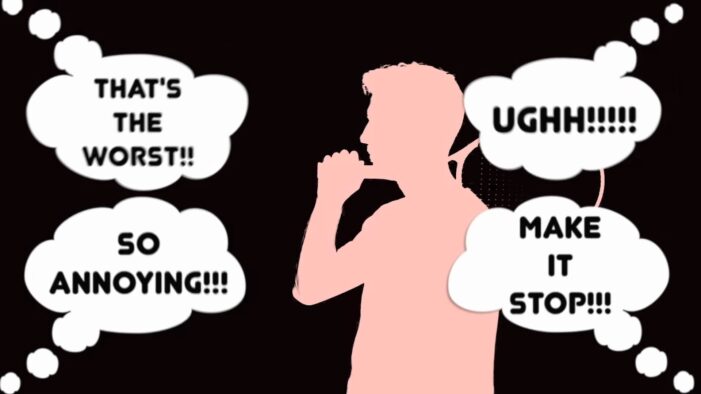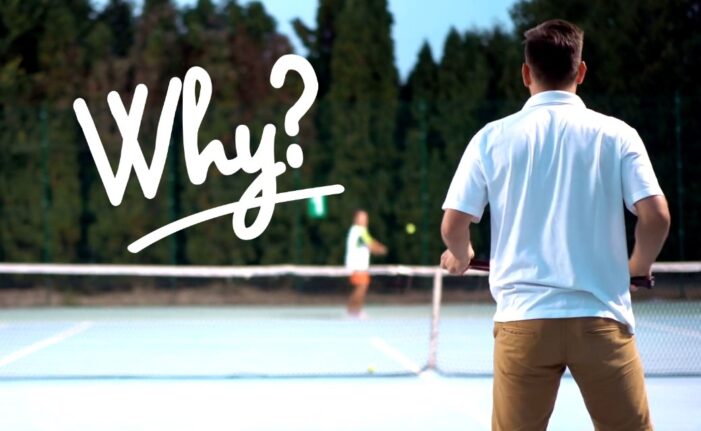Tennis players grunt when they hit the ball with a racquet, a phenomenon that has been observed since the 1980s and which continues to perplex fans and commentators alike. While it’s not always clear why some players grunt more than others, there are many possible theories as to why this action is seen in tennis.
Some argue that grunting helps them to generate more power in the stroke and increase their overall accuracy. In addition, it can be argued that grunting acts as a form of release or relief by providing a focused outlet for the player’s energy during intense points.
Furthermore, it has been suggested that noise may have psychological benefits as well – by intimidating opponents or distracting them from a strategic focus on the court. Finally, some have argued that grunting can be used as an intentional tactic to disrupt an opponent’s rhythm or concentration during a game.
There is limited scientific evidence for these theories, but research indicates that pro-level tennis players do indeed produce more noise than recreational-level players when striking the ball. It may well be an action optimized over the years of evolutionary trial-and-error – either way, it seems likely that what comes naturally for some has lots of potential benefits regardless of whether we understand them all!
The Science Behind Grunting
Have you ever been to a tennis match and wondered why the players are grunting so loudly?
The answer is that grunting isn’t just an annoying habit – it’s actually a technique used by players to improve their performance. In this section, we’ll explore the science behind this unusual practice and find out why players are grunting during their games.
Why do players grunt

Tennis players grunt while playing the game to help them improve their performance by giving them an extra burst of power, improving muscle control, and providing general benefits.
Players and scientists alike have suggested that grunting can increase a player’s maximum force output, improve muscle recruitment and lead to additional positive benefits. For example, a study of female tennis players found that players who do it when playing have higher peak force levels than those who do not.
This means the athletes are producing more power with each stroke. Increased power can result in faster strokes with less effort, which is why many professional athletes swear by the practice.
Additionally, grunting during a tennis match can help an athlete gain better control over their muscles, which is an important factor for executing precise moves on the court. It helps tense up all muscles involved in a stroke at once rather than just pushing from one part of the body at a time; this causes all muscles involved to contribute uniformly towards the movement being executed.
Together these effects allow players to make stronger strokes more accurately while improving their focus on the task at hand by helping them tune out distractions from opponents or spectators nearby.
Ultimately, whether or not it’s beneficial for any particular player is down to personal preference — what works best for one may not work as well for another – but there are numerous studies that point out how grunting during a game may combine physical and mental improvement opportunities in one move; something that ultimately increases competitive advantage over opponents.
How does grunting help

It can be a polarizing topic, as some players and fans find it irritating, while others use it as a way to concentrate and stay focused. But how does this distinctive vocalization actually help?
It has been scientifically proven that the act of grunting can provide a player with both physical and psychological performance advantages. Physically, the act of producing sound through the vocal cords achieves completion of the exhale phase more quickly and violently than if the sound was not produced.
This helps to create additional torque around the core muscles that coordinately contract throughout the service motion, allowing for more power transfer from principal muscle groups during rotation of the body within each stroke.
Psychologically, grunting can have benefits for athletes as well. It serves an important purpose; when engaging in competitive activities, players are faced with heightened cortisol levels and must cope with these emotions to succeed on the court.
Grunting is one way in which players tap into their primal nature to instill focus on the task at hand while also allowing them to release emotions so they don’t become overwhelmingly intense or counterproductive.
These effects are further amplified when coupled with imagery or concentration cues known as ‘trigger words’. For many players, these words serve as reminders of what type of ball flight or court position you desire for each shot – effortless preparation for impact combined with an explosiveness level that makes grunting almost reflexive!
Historical Context

The history of grunting in tennis dates back to the 1970s when players began to experiment with different ways of generating power in their shots. It was during this time that Jimmy Connors became known for his loud grunts on the court, which helped him to become one of the most successful players of his era.
If you’re interested in learning about the oldest Grand Slam tournament in tennis, check out our article on the topic. It’s a great companion piece to our exploration of the science behind tennis grunting.
However, it wasn’t until the 1990s that grunting began to be more widely used by female players. Monica Seles, in particular, became known for her distinctive grunting style, which she claimed helped her to focus and control her breathing during matches. Other female players soon followed suit, and by the early 2000s, grunting had become a common practice in women’s tennis.
Despite its growing popularity, grunting has also been a source of controversy in the sport. Some opponents and fans have complained that it is a form of gamesmanship, intended to throw opponents off their game. Others have argued that it creates an unfair advantage for players who use it, as opponents may find it difficult to anticipate the speed and spin of the ball.
In recent years, there has been growing pressure to address the issue of grunting in tennis. In 2011, the Women’s Tennis Association (WTA) announced that it would begin monitoring and penalizing excessive grunting during matches.
However, this policy has been met with mixed reactions, with some players and fans arguing that it unfairly targets female players and infringes on their right to express themselves on the court.
Despite the controversy surrounding it, this continues to be a defining feature of modern tennis. Whether it is seen as a distraction or a strategic advantage, it is clear that it has had a lasting impact on the sport and the way in which it is played.
Which players have been known to grunt
Tennis has had its share of grunts heard around the world. While it has been a debated issue in the sport for decades with some fans finding the noise distracting and disrespectful, players are free to grunt as they strike the ball. Here are some of the most iconic names and volumes associated with their grunts:
- Roger Federer: Very subtle
- Rafael Nadal: Loud
- Maria Sharapova: Very loud
- Guga Kuerten: Medium loud
- Monica Seles: Very loud
- Martina Hingis: High-pitched and medium volume
Effects of Grunting
One phenomenon seen in professional tennis is the use of grunting. It has been a part of the sport for many years, with some of the biggest players in the game grunting their way to success. But does this act aid their performance?
What are the effects of grunting on their performance? Let’s take a closer look.
Does it affect the player’s performance?
The act of grunting during a tennis match introduces certain effects, both good and bad, to the player’s performance. On one hand, grunting can help players increase their power, as they can use this extra energy to propel the ball across the court with more force. This can also be beneficial in assisting them with movement and giving them a mental boost when they need it most.
On the other hand, it can be distracting to opponents and disrupt their focus on the match. Constant loud noises emanating from a player’s mouth might prevent them from focusing fully on their shots and make it hard for them to concentrate. As an opponent’s view of the game is affected by this unfamiliar sound, it increases their chances of making mistakes that could have been avoided ensuring optimal performance.
Therefore, while grunting has an immediate effect on increasing power during play, its disadvantages are just as significant as their advantages when considering overall performance within a match. Players should assess how they perform without making any noise in order to determine what works best for them during gameplay in order to get the most out of each serve or hit they make during a game or tournament.
Does it affect the opponent’s performance?

The debate over grunting in tennis has been ongoing for many years, with players, trainers, and spectators all having different opinions on the matter. Much of the current research has focused on whether or not the noise affects opponents during a match, while also looking at whether or not it gives players a mental advantage.
Some studies have found that contrary to popular opinion, grunting does not help a player gain any physical advantage over their opponent— such as improving their speed or accuracy — but it can place an incredible amount of psychological pressure on their opponent’s game.
For example, one 2017 study tested the impact of different levels of noise by playing recordings to competitive table tennis players, who found that at higher levels of sound intensity, they struggled to keep up.
The phenomenon also affects non-professional sports enthusiasts as well – a 2010 study asked recreational female volleyball players about their response to noise during practice games and found that participants were more likely to focus on the sound rather than how they were playing — thus decreasing their performance level.
This can be especially important in table tennis where there is limited space between each player, making grunting incredibly distracting and disruptive to focus.
Although professional players are often allowed more lenience when it comes to loud noises during a match – many argue that ‘in-game’ grunting should be penalized more closely in order to maintain a higher level of respect and fairness amongst competitors.
If you’re curious about the habits and rituals of tennis players, our article on why do they eat bananas may be of interest to you.
FAQs

1. Is there a correlation between a player’s success and grunting?
There is no direct correlation between a player’s success and grunting. Some successful players grunt while others do not.
2. Can grunting be considered a form of cheating?
No, it is not considered cheating, as it is not against the rules of the game.
3. Can players be penalized for excessive grunting?
There is no specific rule that penalizes players for it. However, if a player is deemed to be deliberately disrupting their opponent’s game, they can receive a warning or a penalty.
4. Is there a scientific reason behind grunting in tennis?
Yes, studies have shown that it can increase a player’s focus, power, and oxygen intake during matches.
5. Can opponents complain about a player’s grunting?
Yes, opponents can complain to the chair umpire if they feel that a player’s grunting is excessive or disruptive to their game.
6. Is there a limit to how loud a player can grunt?
There is no specific limit to how loud a player can grunt in tennis. However, if it is deemed excessive and disruptive, they can receive a warning or a penalty.
7. Can players train themselves to stop grunting?
Yes, players can train themselves to stop doing it by practicing breathing techniques and focusing on controlling their vocalizations during matches.
8. Is grunting in tennis a controversial topic?
Yes, it has been a controversial topic in tennis, with some people seeing it as a legitimate part of the game and others viewing it as a form of gamesmanship or even cheating.
Conclusion
In conclusion, the use of grunting in tennis is often seen as a form of “verbalization,” a way of releasing built-up energy and pressure. It can also give a defensive advantage to opponents, as it distracts and disrupts the flow of the match.
However, some players prefer to keep their grunting to a minimum due to the costs associated with drawing attention such as possible line violations from referees or being penalized for hindering an opponent’s ability to hear.
Ultimately, it is up to each individual player if they would like to include grunting as part of their game style or not.

